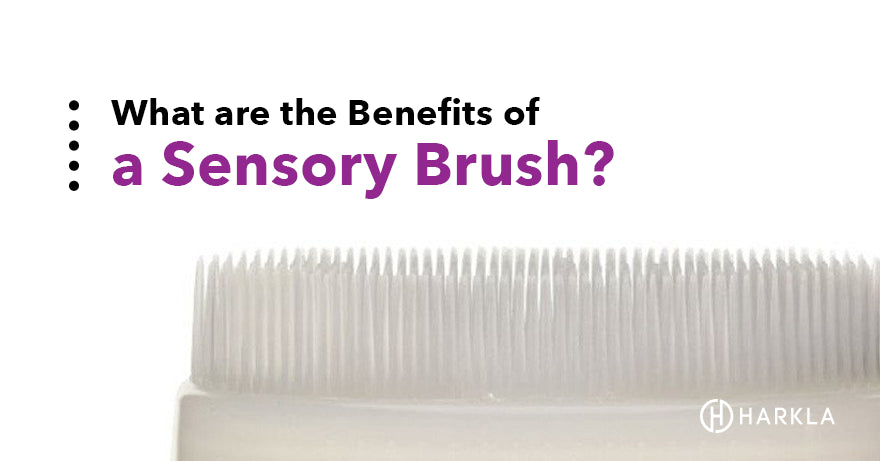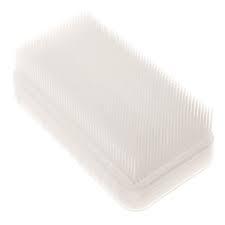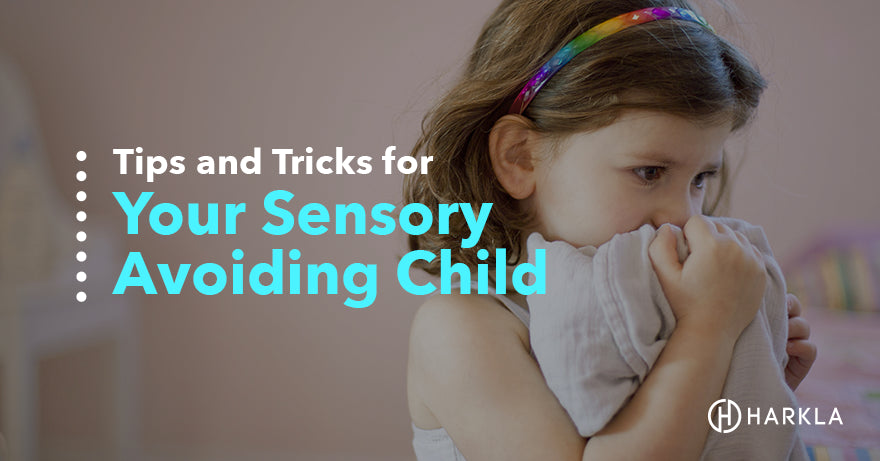Your Cart is Empty

A sensory brush for autism, or therapy brush, is used as part of the Wilbarger brushing protocol, something that an occupational therapist, trained in sensory integration techniques, may prescribe as part of a home sensory program for your child.
The technique is called “brushing” only because of the tool that is used, but it’s not with your typical hairbrush.
A sensory brush is not a typical hairbrush; it is a specialized therapy tool used for deep-pressure input as part of the Wilbarger Brushing Protocol.
Brushing therapy helps calm the nervous system, especially for children with tactile sensitivity, sensory seeking behaviors, or sensory defensiveness.
The technique provides deep, firm pressure, not light strokes, which helps organize touch receptors and regulate arousal levels.
When paired with joint compressions, the protocol can support improvements in focus, self-regulation, transitions, and motor coordination.
Brushing is most effective when used consistently throughout the day as part of a sensory diet and guided by an occupational therapist trained in sensory integration.
A sensory brush looks like a surgical scrub brush, or a brush used to remove corn silk from a corncob.

A sensory brush or brushing program is often indicated for pediatric clients that have sensory dysfunction such as tactile sensitivity, hyperactivity, or general sensory dysregulation.
For information on Sensory Processing Disorder, check out our article here.
It can help patients who engage in unsafe or undesired behaviors or are sensory seeking. Brushing can help children who are slow-to-start, or overly cautious, and those that are picky eaters. Pediatric clients may benefit from brushing if they struggle with poor motor coordination or balance issues.
Some of the sensory brush benefits are that it improves:
It can increase a child’s ability to optimize their arousal and activity levels as well as decrease sensory defensiveness. The Wilbarger brushing protocol involves the sensory brush, paired with joint compressions, completed in a sequence and according to a schedule.
It can be done at school and home and should be carried out as part of a healthy sensory diet, several times per day.
Brushing therapy provides deep-pressure tactile input to the skin using a small sensory brush. This technique targets the tactile and proprioceptive systems, which play key roles in body awareness, regulation, and movement.
Here’s how it works:
Firm, even pressure is applied to the arms, legs, back, and other safe areas (avoiding the face, stomach, and chest).
This input helps calm overactive touch receptors that may trigger discomfort, anxiety, or sensory overload.
The pressure helps the brain better process sensory information, which may:
Lower stress reactions
Improve attention
Make transitions easier
Reduce defensive or avoidant behaviors
Brushing can help bring a child’s alertness to a more organized, “just-right” level—whether the child is:
Under-responsive and slow-to-start
Overstimulated
Sensory seeking
After brushing, therapists typically add a short sequence of gentle compressions to:
Shoulders
Elbows
Wrists
Fingers
Hips
Knees
Ankles
This adds proprioceptive input that helps stabilize and integrate the effects of brushing.
For best results, brushing is done:
Consistently
At scheduled times
As part of a child’s overall sensory support plan
It can prepare a child for overwhelming environments, calm them at bedtime, or help regulate during the school day.

The technique is a deep-pressure input applied to the skin, firmly - so it does not scratch, itch or tickle.
By rubbing the brush across the skin, the pressure input targets touch receptors and helps a child organize his/her central nervous system.
This can calm down any over-active receptors that are misfiring and help bring a child’s level of alertness to a normal (calm) level.
Brushing is a good way to establish a sensory diet routine and add a preparatory activity.
For example, if a child has a difficult time tolerating a busy environment like a birthday party or holiday gathering, brushing can be used to ‘prepare’ the child’s nervous system to enter that situation, by aiding regulation. At bedtime, brushing can be used as part of a wind-down routine to signal the brain and body to get ready to sleep.
Read more about improving sleep for those with sensory processing disorder here.
A warm cup of milk, a short yoga sequence, brushing and a bedtime story can prepare all the sensory systems for rest.
Another perfect place for brushing is in bonding between parent and child. Brushing can be similar to infant massage in principle, as it is done with a trusted caregiver and helps target the proprioceptive system and calm the tactile (touch) system. Brushing should be a desired activity for the child and enjoyed by both participants.
A song or quick story can add to the routine, and a bear hug or snuggle at the end can make the experience special and help the child look forward to the routine.
If you have had success with using a sensory brush with your child, we'd love to hear about it!
You use a sensory brush by applying firm, even pressure on the arms, legs, and back. The brushing should never scratch or tickle. Avoid the face, chest, and stomach. An occupational therapist should show you the correct technique before starting.
Brushing is usually done every 2 hours while the child is awake, especially at the beginning of the program. The exact schedule may be adjusted by an occupational therapist based on how the child responds.
A sensory brush is designed for deep-pressure sensory input and has soft, dense bristles that feel calming. A regular brush, like a hairbrush, is not made for sensory therapy and won’t give the same type of pressure or effect.
Yes. Many children show better focus after brushing because deep pressure input can help the nervous system feel calmer and more organized, making it easier to pay attention.
Brushing can help reduce anxiety for some children by providing calming input to the nervous system. This deep pressure can lower sensory overload and help the child feel more relaxed.
Hello. I am totally blind, autistic and have complex PTSD.
I have a couple questions. Do you think the brushing could help relieve symptoms of my CPTSD? I do music therapy and talk therapy, and unfortunately they have no experience with the brushing technique. And I don’t have an occupational therapist.
Also, am I allowed to use the sensory brushes as a way of tactile stimming and fidgeting? I just love how soft the brushes feel to the touch, and I’m a sensory seeker and I love to either brush my arms and hands, or I love it when someone just brushes me even if I’m not dysregulated.
Hello! I’ve been trained in the brushing protocol and was told to always follow up brushing with joint compressions. Just curious, what’s the reasoning behind not being able to just do the brushing by itself? Thanks!
What can you recommend for a two month old infant that has uncontrolled crying episodes, lasting sometimes for 4 hours, that may be due to sensory processing disorder?
Hi Cathie,
Thank you for reading our blog! That’s a really good question. We recommend reaching out to an OT who works with stroke patients. It’s very likely that sensory brushing could have benefits. Also, there is a good article about sensory brushing for stroke patients found here: https://www.ncbi.nlm.nih.gov/pmc/articles/PMC6283184/
-Nicole from Harkla
Are sensory brushes helpful for stroke pateints, that have lost arm movement?
Hi Camille,
Thanks for reading our blog! A surgical brush is recommended as the bristles are stiff and do not bend easily, providing the right amount of sensory input on the skin. Let us know if you have any other questions.
Thanks!
Nicole from Harkla
Can’t i just use any brush on my 13 yrs old ADHD daughter?
Hey Peter,
I would recommend using different sensory brushes for each child. One exception may be if the children are siblings. It’s a really good idea to buy a pack of many brushes since the bristles do wear out.
Hope this info helps,
Nicole
Harkla
thanks molly shaw Wilson for this great information. please I want to find out if it possible or appropriate to use one therapy brush for more than one child?
secondly can it also help in improving writing skills in children with neess?
Hi Janine,
Thanks for your question! I highly recommend talking to your child’s OT. Also, try doing a search on YouTube for “Wilbarger Protocol”. You may be able to find some very helpful “how to” videos.
All the best,
Nicole
Harkla Happiness Ninja
Do you provide workshops on how, when and why to use brushing technique?
Hi Delene and Fatima,
Thanks for your questions. To find out more about sensory brushing, we recommend talking to an occupational therapist. Results that are seen may differ, depending on the individual. Also, it’s hard to know exactly how long it will take a child to be okay when using a sensory brush. Again, we advise that you speak to an OT for more info!
-The Harkla Team
How long will it take the Child to be okay when using the sensory brush?
I would like to know if brushing could alleviate neuro pain in arms?
Comments will be approved before showing up.


Donna
May 09, 2024
Hello! Is it possible to perform therapeutic brushing without an OT degree? My son suffers from severe sensory processing difficulties as a result of level 3 autism and ADHD. I am interested in purchasing the sensory brush, but I am hesitant to do the brushing myself. Is there a program I can join to get certified for this? We are from rural South Dakota, and resources are scarce here. We have to do what we have to do. Please advise.